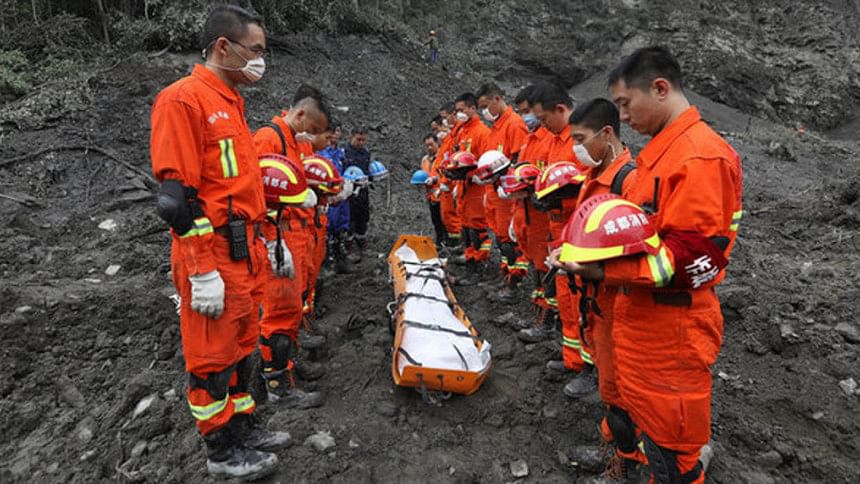Hopes dim in search for 118 buried by China landslide

Rescuers dug through earth and rocks for a second day on Sunday in an increasingly bleak search for some 118 people still missing after their village in southwest China vanished under a huge landslide.
Officials have pulled 15 bodies from the avalanche of rocks that crashed into 62 homes in Xinmo, a once picturesque mountain village nestled by a river in Sichuan province.
Only three survivors -- a couple and their one-month-old baby -- have been found since heavy rain brought down a side of the mountain early Saturday, officials said.
At least 118 people remain missing, according to the local government -- the Tibetan and Qiang Autonomous Prefecture of Aba.
The official Xinhua news agency cited geological experts at the site as saying the chance of finding any survivors "was really slim".
Qiao Dashi, the surviving baby's father, said he had woken up after 5:00 am to change his crying son's diaper when he "heard a big noise coming from the back".
"The house shook," he told state broadcaster CCTV from his hospital bed. "Rocks were in the living room. My wife and I climbed over, took the baby, and got out."
"I have superficial injuries. Overall, I'm okay. But psychologically, it's hard. The entire village, with dozens of families, was flattened," he said, with a bandage around his head.
At least half a dozen red excavators removed debris at the base of the slope on Sunday as the search continued.
Rescuers with lights on their helmets and sniffer dogs had searched for people through the night as lamps illuminated the grey rubble, according to images on state media.
Some 3,000 workers with life-detection instruments were taking part in the search, Xinhua said.
The landslide blocked a two-kilometre (one-mile) stretch of river and 1.6 kilometre of road.
- Quake 'weakened' mountain -
No sign of the village could be seen in aerial footage, which showed a grim and grey rock-strewn landscape covering the area where it once existed by a river.
In Diexi, another hamlet overlooking Xinmo, corn and potato farmer Yang Cangxin said she knew everyone in the neighbouring village.
"It's so hard to imagine something like that happening when you're sleeping quietly and peacefully in your own bed. It's just awful. They had no idea what was coming," Yang, a woman in her 40s, told AFP.
"I've lost contact with all my friends there. Many of us came here to look at the scene. We were all crying, heartbroken."
Xinmo residents were farmers who grew corn, peppercorn and potatoes, she said, though some had opened guest houses for tourists.
Xu Zhiwen, the prefecture's deputy governor, said there had been 142 tourists visiting the village on Friday but that none of them were buried.
Some 30 people from another village brought wheelbarrows packed with bottled water, tubs of food and plastic bags of meat down the hill for any potential survivors.
Police blocked the road several kilometres from the entrance of the village.
- Past disasters -
President Xi Jinping called for rescuers to "spare no effort" in their search for survivors and prevent more disasters.
More than 100 people living close to the landslide were being evacuated, Xinhua reported.
"It's the biggest landslide in this area since the Wenchuan earthquake," said Wang Yongbo, one of the officials in charge of rescue efforts, referring to the disaster that killed 87,000 people in 2008 in a town in Sichuan.
Landslides are a frequent danger in rural and mountainous parts of China, particularly at times of heavy rains.
At least 12 people were killed in January when a landslide crushed a hotel in central Hubei province.
More than 70 were killed by a landslide in the southern commercial hub of Shenzhen in December 2015, caused by the improper storage of waste.
One of the deadliest landslides took place in 1991, when 216 were killed in southwestern Yunnan province.

 For all latest news, follow The Daily Star's Google News channel.
For all latest news, follow The Daily Star's Google News channel. 







Comments